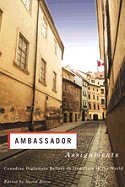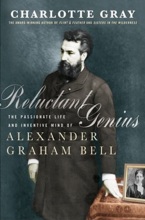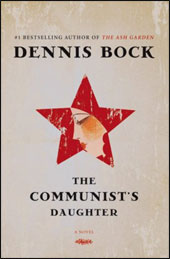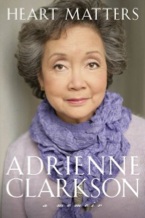 This is an interesting book for anyone, but particularly if you live in Ottawa. You often meet someone here who has served at one time in a Canadian embassy abroad. Sometimes they have become so “diplomatic” in their jobs that they don’t talk very frankly about what they did. In this book, David Reece, who had ten postings himself with Canada’s foreign service,five as ambassador, has found nineteen diplomats who share their experiences, with candor and insight.
This is an interesting book for anyone, but particularly if you live in Ottawa. You often meet someone here who has served at one time in a Canadian embassy abroad. Sometimes they have become so “diplomatic” in their jobs that they don’t talk very frankly about what they did. In this book, David Reece, who had ten postings himself with Canada’s foreign service,five as ambassador, has found nineteen diplomats who share their experiences, with candor and insight.
There are notes on the big posts, Washington and London, but also pieces on coping with apartheid in S. Africa, developing foreign policy on frontiers such as Burma. It is not all simply a matter of sending good dispatches back to Canada and building good relations at receptions and dinner parties. Accounts from China, and Lebanon, tell of real danger, when wives and children are sent home while the host country is facing demonstrations or revolution.
The book makes a very good case for the continued value of diplomacy, of good personal relations, of humour and frankness in dealing with relations between countries. Even in an age of Email and instant communication, the human element is still reassuringly important.
Thanks to Anne McDougall for the Review!


 Maybe she shouldn’t have written it now – maybe never – you will hear both criticisms – but I find Adrienne Clarkson’s “Memoirs” complete readable, as frank and self-promoting as she is herself.
Maybe she shouldn’t have written it now – maybe never – you will hear both criticisms – but I find Adrienne Clarkson’s “Memoirs” complete readable, as frank and self-promoting as she is herself. Authentic Food From A Tuscan Farm by Susan McKenna Grant Translated, the title means “Slowly, Slowly, Full.” And this offering from another Canadian turned property owner in Tuscany is a fine offering in the world of cookbooks that also try to mingle regional history and recipes. Susan McKenna Grant covers meat, fish, poultry, pasta, and deserts. Bread making, salad dressings, various stuffings, and making gnochi are featured as well.
Authentic Food From A Tuscan Farm by Susan McKenna Grant Translated, the title means “Slowly, Slowly, Full.” And this offering from another Canadian turned property owner in Tuscany is a fine offering in the world of cookbooks that also try to mingle regional history and recipes. Susan McKenna Grant covers meat, fish, poultry, pasta, and deserts. Bread making, salad dressings, various stuffings, and making gnochi are featured as well. by Betsy Burton. The title of this book is the name of a long-established independent bookstore in Salt Lake City, Utah. Written by one of the founders, it is an engaging account of bookselling: its ups and downs and its often very humourous situations. Tales of famous authors who have visited the store add to the charm of this very interesting book and it discusses the struggle of the independent stores in modern times. A wonderful added feature are many booklists covering various genres, bestsellers and childrens’ books etc. through the years.
by Betsy Burton. The title of this book is the name of a long-established independent bookstore in Salt Lake City, Utah. Written by one of the founders, it is an engaging account of bookselling: its ups and downs and its often very humourous situations. Tales of famous authors who have visited the store add to the charm of this very interesting book and it discusses the struggle of the independent stores in modern times. A wonderful added feature are many booklists covering various genres, bestsellers and childrens’ books etc. through the years. by Geraldine McCaughrean. Romantic and heroic this beautiful re-telling of the story of Cyrano de Bergerac is a treat for young adults and adults alike – a real treasure!
by Geraldine McCaughrean. Romantic and heroic this beautiful re-telling of the story of Cyrano de Bergerac is a treat for young adults and adults alike – a real treasure! by Kate Muir. This is a wonderful, funny and bittersweet book which tells the story of the marriage of Madison and Olivier and of their daughter; it is so Parisien in its descriptions both geographical, culinary and socially and is hard to put down.
by Kate Muir. This is a wonderful, funny and bittersweet book which tells the story of the marriage of Madison and Olivier and of their daughter; it is so Parisien in its descriptions both geographical, culinary and socially and is hard to put down. by Anne Perry. Set in England, it continues the story of the Reavley brothers’ search for the Peacemaker who killed their parent and plots to reshape Europe and the world. It is filled with tension and excitement and peoples’ relationships in a time of strife and horror and grips one to the very end.
by Anne Perry. Set in England, it continues the story of the Reavley brothers’ search for the Peacemaker who killed their parent and plots to reshape Europe and the world. It is filled with tension and excitement and peoples’ relationships in a time of strife and horror and grips one to the very end.